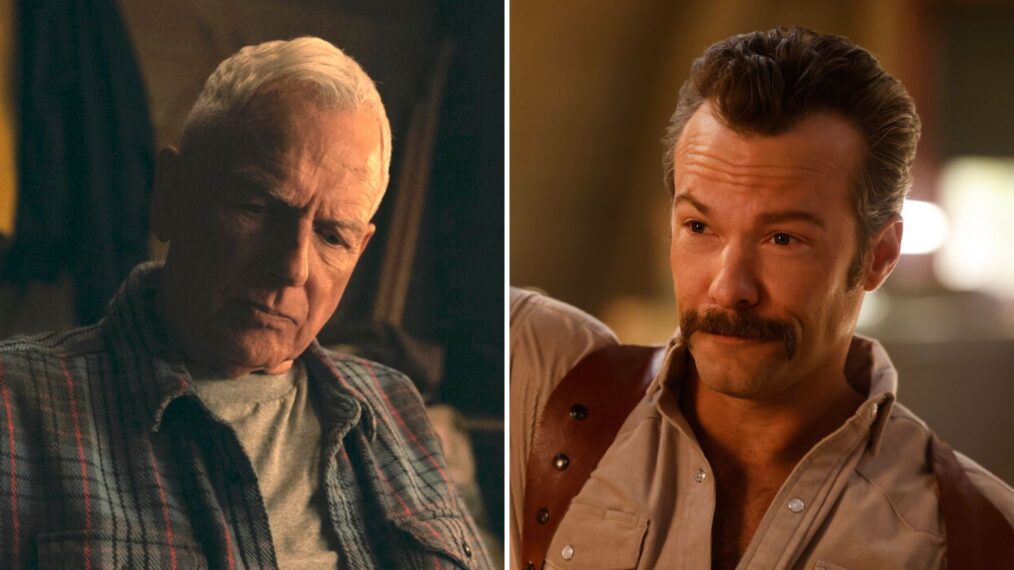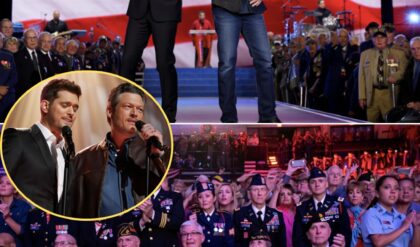Fans of the long-running procedural powerhouse NCIS thought they had bid a final farewell to the stoic, rule-bound special agent who defined the series for nearly two decades. Leroy Jethro Gibbs, portrayed with unflinching intensity by Mark Harmon, rode off into the Alaskan wilderness at the end of season 19 in 2021, leaving a void that no amount of narrative maneuvering could fully fill. The franchise soldiered on, introducing new leads and spinning off prequels to keep the investigative fire burning. But on November 11, 2025, in a Veterans Day special that aired on CBS, Harmon shattered the silence with a surprise return that rippled through the NCIS universe like a seismic aftershock.
It was Kyle Schmid, the charismatic Canadian actor stepping into the boots of a young Mike Franks in the prequel NCIS: Origins, who first let the cat out of the bag in a candid interview that ignited social media. “Mark’s return doesn’t just connect timelines—it raises the emotional stakes and brings back the heart of what NCIS truly is,” Schmid enthused, his voice laced with the kind of reverence reserved for a mentor’s legacy. Playing Franks—the grizzled NIS operative who shaped Gibbs into the Marine-turned-agent we know—Schmid has spent the past year immersing himself in the character’s complexities. But nothing, he admitted, prepared him for the moment Harmon stepped onto the set of Origins. “We all felt it—the torch was truly passed,” Schmid said, describing a crossover scene that “changes everything.” For Schmid, it wasn’t mere nostalgia; it was a pivotal handoff that “elevates the entire franchise,” bridging the raw ambition of the 1990s origins story with the weathered wisdom of the present-day squad.

The episode in question, a two-hour crossover event split between NCIS: Origins season 2, episode 5 (“Funny How Time Slips Away”) and NCIS season 23, episode 5 (“Now and Then”), unfolded like a masterclass in serialized storytelling. It opened in the misty isolation of present-day Alaska, where Harmon’s Gibbs—older, quieter, but no less commanding—tinkers with a ham radio in his rustic cabin. The scene, bathed in the soft glow of a wood-burning stove, captures Gibbs in a rare moment of vulnerability. He’s not alone, though; a loyal German Shepherd mix, rescued from a storm-swept trail, pads silently at his side, sharing scraps from a simple meal of canned beans and cornbread. As Willie Nelson’s melancholic “Funny How Time Slips Away” croons over the soundtrack, Gibbs fiddles with the radio dials, static crackling like unspoken regrets. It’s a deliberate callback to his self-imposed exile, a man haunted by loss—his wife and daughter, his team, his unyielding sense of duty. The dog’s presence, a subtle evolution from Gibbs’ lone-wolf persona, underscores a theme producers have teased: solitude doesn’t have to mean loneliness.
But this serene interlude serves a greater purpose. A garbled emergency broadcast filters through the static—an evacuation order tied to a decades-old case bubbling back to life. Without a word, Gibbs powers down the radio, his jaw set in that familiar line of determination. It’s a seamless pivot to the 1990s, where Origins takes center stage. Austin Stowell, embodying a pre-Gibbs Jethro with boyish fire and unpolished edges, leads a ragtag NIS team through the fog-shrouded streets of a remote coastal town. The victim: a abrasive sailor whose penchant for picking fights made him more enemy than ally. The prime suspect: the local sheriff, a weathered everyman who confesses to the crime with quiet resignation. Gibbs and his partner, Franks (Schmid channeling a blend of roguish charm and moral ferocity), haul him in, but the case unravels like frayed rope.
What follows is a taut procedural laced with personal stakes. The sheriff’s confession? A noble lie to shield his lover—a married woman carrying his child—from scandal and scrutiny. As the team digs deeper, they uncover a web of small-town secrets: the real culprit is the victim’s hotheaded grandson, driven to violence by years of resentment. Franks, ever the intuitive investigator, feels the injustice gnaw at him. “You don’t pin a badge on a ghost,” he growls to Gibbs during a rain-soaked stakeout, his voice cracking with the weight of a decision that will echo through his career. Schmid’s portrayal shines here, infusing Franks with a vulnerability that foreshadows the mentor he’ll become. The episode builds to an interrogation room standoff, Franks locking eyes with the sheriff across a scarred wooden table. Tension coils like a spring—until the camera pulls a visual sleight of hand. The sheriff’s face dissolves in a haze of VFX magic, morphing into the craggy features of Muse Watson, the original Franks from the flagship NCIS. It’s a meta moment of pure poetry, a torch-passing that blurs actor and icon, past and present.
Watson’s cameo, filmed in a single, emotionally charged day, adds layers of franchise lore. The veteran actor, who first brought Franks to life in 2003, reprises the role not as a flashback but as a spectral guide, visiting the imprisoned sheriff across the years until his own death. “Kyle’s got the soul of Franks down pat,” Watson later shared in a set visit anecdote, describing a pre-shoot breakfast where he coached Schmid on vocal inflections and that signature squint. For Schmid, it was surreal: “Muse isn’t just reprising—he’s reclaiming. Standing there, feeling that energy transfer… it was electric.” This handover isn’t gratuitous; it’s the emotional core of the crossover, a reminder that NCIS thrives on legacy. Franks’ lingering guilt over the wrongful conviction propels the narrative forward, seeding doubts that will harden into the rules that define Gibbs.
The baton then passes to the present-day NCIS team, where the case resurfaces like a tide pulling at old wounds. Alden Parker (Sean Murray) and his squad—Nick Torres (Wilmer Valderrama), Ellie Bishop (Katrina Law), and the ever-reliable Timothy McGee (Sean Murray, wait no—McGee is Brian Dietzen? Wait, standard cast: Gary Cole as Parker, etc.)—dive into cold case files, uncovering how the sheriff’s imprisonment rippled through decades, culminating in a prison break and a desperate bid for exoneration. Roma Maffia returns as Vera, the sharp-tongued analyst whose banter with McGee crackles with unresolved tension. “Gibbs would be proud of you, Tim,” she quips during a tense wiretap session, a line that lands like a gut punch, bridging eras with quiet affection. Older versions of Woody (Bobby Moynihan) and Phil (Ely Henry), now grizzled NCIS vets, bicker over procedural minutiae, their comic relief a balm against the heavier beats.
Yet it’s the undercurrents that truly bind the episodes. A subplot weaves in the Navy’s 250th anniversary time capsule debate, where the team settles on including Ducky’s posthumous memoir, The Stories We Leave Behind. Penned as a heartfelt tribute to the late David McCallum, the book—filled with case files, team photos, and scribbled notes—symbolizes the “family” Gibbs always championed. No grand speeches, just a quiet nod to lost comrades. And throughout, echoes of Gibbs’ rules punctuate the action: Rule #11, “When the job’s done, walk away,” taught by Franks in the ’90s, haunts the sheriff’s arc, while Gibbs’ Alaskan solitude embodies its bittersweet truth.
Behind the scenes, the crossover was a labor of love, born from producers David J. North and Gina Lucita Monreal’s desire to honor Harmon’s indelible mark. Initially scripted with archival clips, the plan evolved when Harmon, still an executive producer on Origins, greenlit an on-camera return. “I’m very proud of the storytelling that David and Gina are doing,” Harmon told Parade Magazine in an exclusive chat. “They continue to push boundaries and dive deeper into the characters’ backstories. They came to me with an idea for Gibbs that I liked, and it seemed like a good time to check in with him.” Filming his Alaska sequence was methodical—Harmon insisted on authentic details, like soldering the radio himself, sparks flying under studio lights. The dog? A spontaneous addition, inspired by Harmon’s real-life affinity for pups and North’s own four-legged co-pilot. “Gibbs is no longer alone,” the producers teased pre-air, a line that proved prophetic as the Shepherd became an unspoken co-star, its soulful eyes mirroring Gibbs’ guarded heart.
Schmid, fresh off the high of the morph scene, couldn’t contain his awe. In a post-episode breakdown, he elaborated on the set’s electric hush during Harmon’s arrival. “The crew went silent. It’s like the air thickened—everyone knew this was history.” For the 40-year-old actor, known for roles in A Few Good Men and The Covenant, inhabiting Franks has been transformative, but Harmon’s presence crystallized it. “Mark doesn’t just play Gibbs; he is the franchise’s north star. That reunion? It left us speechless. The young Gibbs and Franks staring down their futures, then cutting to Mark… it was the most powerful callback I’ve ever been part of.” Schmid’s words echo a sentiment rippling across fan forums: this wasn’t fan service; it was resurrection.
The reaction online was a torrent—equal parts elation and hunger for more. X (formerly Twitter) lit up post-airing, with #GibbsReturns trending nationwide. “Finally! That morph to Muse Watson? Chills,” gushed one user, while another lamented, “5 minutes of Harmon? Tease!” Veterans Day timing amplified the patriotism, with posts praising the episode’s nod to service and sacrifice. TVLine captured the buzz, noting how the dog’s debut sparked a “dog-loving tradition” thread, fans speculating on future Alaskan arcs. Even critics hailed it: TV Fanatic called it a “prequel that demands respect,” though some nitpicked the brisk pacing.
For Harmon, the return stirred introspection. In an Entertainment Weekly sit-down, he confessed a humorous blind spot: “I don’t remember most of the rules—except the one about always carrying a knife.” It’s a revelation that might “destroy some fans’ hearts,” as co-creator North joked, but it humanizes the icon. Teasing future cameos, Harmon demurred coyly: “Never say never. The door’s cracked open.” Producers hint at more—perhaps a Lala reunion or Torres family ties—but for now, this crossover stands as a fulcrum, pivoting Origins from origin story to linchpin.
In an era of reboots and retreads, this event reaffirms NCIS‘ enduring alchemy: blending grit, grief, and unbreakable bonds into television gold. Schmid nailed it—Harmon’s return changes everything, not by rewriting history, but by reminding us why we tune in. The heart of NCIS? It’s in those passed torches, those slipped-away times, and the agents who refuse to walk away. As Gibbs solders his radio in the fading light, one thing’s clear: the signal’s stronger than ever. The franchise isn’t just elevated—it’s unbreakable.





